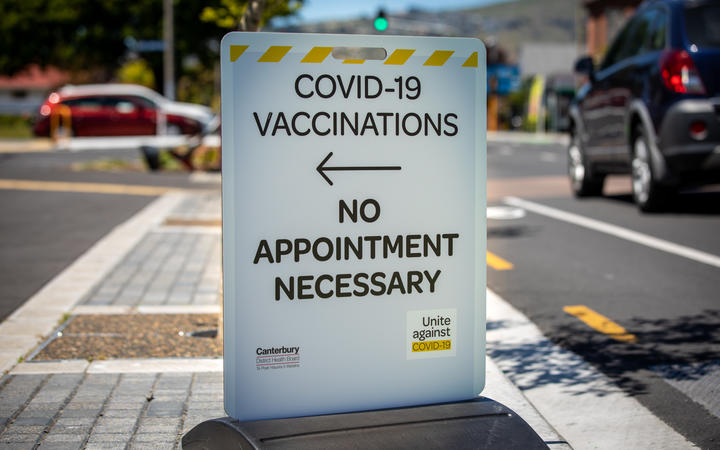The one million New Zealanders who are so far delaying getting their booster shots are the biggest concern of top covid-19 adviser Sir David Skegg.
Phase two of New Zealand’s Omicron response plan begins at 11.59pm tonight, as daily cases rocket toward the 1000 mark.
Sir David, who is chair of the Strategic Covid-19 Public Health Advisory Group, said Aotearoa is much more ready than any other country he can think of to face an omicron outbreak on a large scale.
- Anti-vaccine mandate protests: Victoria University of Wellington supports police tactics
- Simon Wilson on the ‘fascists in our midst’
- Other NZ covid outbreak reports
The experience of other countries has shown New Zealand that the country cannot beat omicron in the way it beat the original virus and to a large extent Delta, he said.
“I see this as a strategic withdrawal. It has been carefully planned. It shows that omicron is now getting the upper hand.”
He praised public health officials for their “Rolls-Royce” contact tracing but said there was now no choice except to move to phase two.
However, his greatest concern is the numbers who are still to get their booster shot, he told RNZ Morning Report.
Two doses ‘not adequate’
“I’m amazed that there’s more than a million New Zealanders who are eligible for the booster dose who have not yet taken up that opportunity. This is crazy.
“I think it’s time we stopped talking about people being fully vaccinated if they’ve only had two doses.”
The virus had mutated, Sir David said, and omicron was better at evading the vaccine immunity.
“So two doses of the vaccine doesn’t give adequate protection.”
He urged all those eligible to make an appointment or get it done today.
“No point having it in a few weeks after you’ve become sick.”
He referred to Denmark which has a similar population to New Zealand and is sometimes held up as a covid-19 success story.
He pointed out that it had seen 4000 deaths and was still having around 27 people die daily whereas Aotearoa’s total death toll in two years was 53.
Challenges face the country
“The next few months are going to be very challenging for this country. We are going to experience something of what those other countries had, so I think we all need to fasten our seat belts.
“It’s not just health although many of us will become sick and a considerable number will die. It’s also going to affect business, it’s going to affect social life and it’s going to affect education. The best thing people we can do right now is get boosted.”
He said people were tired of the pandemic but now was not the time to be considering removing restrictions.
While there was some fragmentation on the best way to deal with covid-19, there was also a consensus that New Zealanders did not want to see large numbers of people get seriously ill or die.
He said as an older person he would be doing his best to avoid getting the virus. He would be restricting his contact with other people while trying to live as normal a life as possible.

Pragmatic managing of omicron
Te Pūnaha Matatini principal investigator Dr Dion O’Neale says phase two is a pragmatic way to manage the growing omicron outbreak.
He told Morning Report that the high numbers of the last couple of days were pulling the country back in line with what the modelling had been predicting for a while.
“So we’ve seen overseas and we’d expect to see in New Zealand doubling times every three days. So that’s your trend.
“On top of that there will be little ups and downs … from here they go up.”
Dr O’Neal said the country had been able to slow down the spread of omicron, due mainly to the work of contact tracers. Their efforts had “put the brakes on” a growth of cases.
However, once case numbers got high there was not enough capacity to contact trace for every case and the spread would speed up, leading to the inevitable decision to move to phase two.
New system more online focused
“It’s an acknowledgement that with these high case numbers systems and processes they won’t have the capacity to deal with the large numbers and we need to try and change how we respond to covid.”
Until now, the contact tracing system has been very personal with contact names identified and these people are then rung and given advice.
The new system will be more online focused, with a text message with a positive result sent, and then the person will be asked to fill in an online form and the information is passed on.
O’Neal said it would be important for people to pass on information on possible exposures as quickly as possible, not waiting for official processes which might be slower as systems became stretched.
“Go home and take your children” — that was New Zealand Prime Minister Jacinda Ardern’s plea yesterday to protesters remaining at Parliament.
Despite being trespassed from Parliament grounds a week ago, protesters remain on the Parliament lawn and show no sign of leaving in spite of a new record 981 community covid-19 cases yesterday.
This article is republished under a community partnership agreement with RNZ.
This content originally appeared on Asia Pacific Report and was authored by APR editor.
APR editor | Radio Free (2022-02-14T21:30:26+00:00) Omicron spread: ‘Crazy’ shortfall in booster numbers worries top NZ covid-19 adviser. Retrieved from https://www.radiofree.org/2022/02/14/omicron-spread-crazy-shortfall-in-booster-numbers-worries-top-nz-covid-19-adviser/
Please log in to upload a file.
There are no updates yet.
Click the Upload button above to add an update.